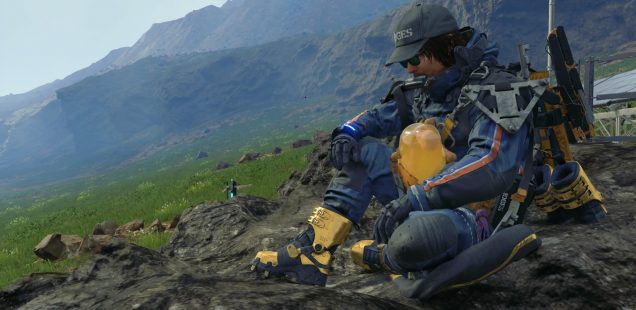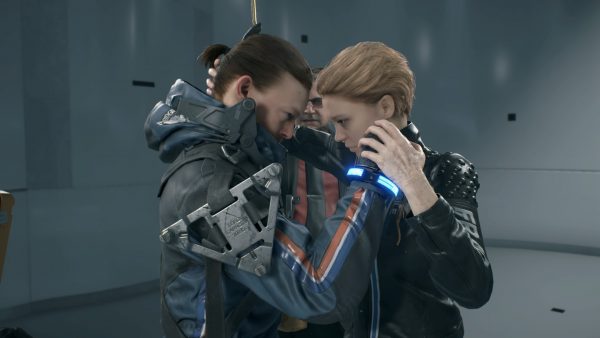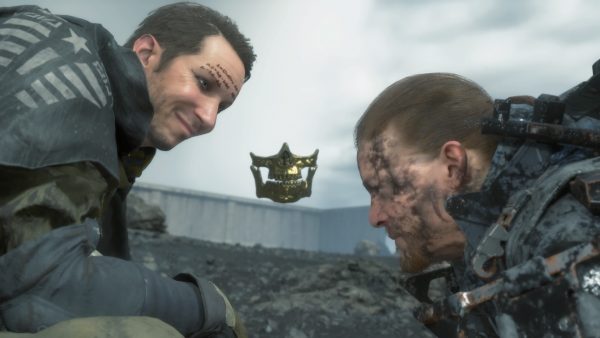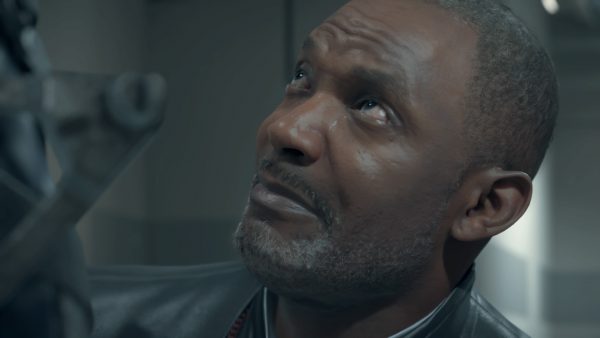
Intricate Rituals and the Ties that Bind: Emotive Masculinity in Death Stranding
Wyeth Leslie and the boys are back in town.
This article contains spoilers for Death Stranding.
Within pop culture, particularly video games, male characters have largely been defined by their capacity for violence, as if it was their only option for interacting with the world around them. It often feels like a trade-off that in order for men to be friends or fathers, there must be war or at least some level of bloodshed. Whenever violence is used as a cornerstone of male relationships, it brings to mind the words of American conceptual artist Barbara Kruger, “You construct intricate rituals which allow you to touch the skin of other men.” As video game budgets have ballooned, we’ve seen fewer risks taken. There are an increasing number of large budget games that play it safe with both mechanics and characters and let’s be honest, violent men sell games. Hideo Kojima’s Death Stranding (2019) occupies a contrasting place in the current environment of AAA video games. Its men are willing and sometimes eager to achieve their goals through firepower, but the game as a whole takes a riskier and gentler approach, particularly in its portrayal of male characters. This is a game that lets its men grieve, rage, and bond in ways that aren’t commonly depicted within big-budget video games. Even more surprising are Death Stranding’s overarching themes about the rejection of hopeless fatalism and isolation in order to embrace fatherhood, empathy, and community.
You play as Sam Porter Bridges (Norman Reedus, whose heartfelt motion-capture performance gives weight to the role), who works as an actual porter, a delivery man in a shattered America. At the start of the game, he is a man apart; like the country he has become haunted by both figurative and literal ghosts. Other people have become a threat as each body, alive or dead, has the potential to cause what’s known as a voidout (a large-scale explosion), and thus many have adapted by living in isolated doomsday shelters. The only way for these individuals to receive needed supplies is through Porters, which is where Sam comes in. Hired by the company Bridges to help rebuild America, he is given a helpful tool of the trade that will change his life: a Bridge Baby, an infant in a pod that can sense the unseen specters. It’s an interesting blurring of the lines between genders as Sam undertakes an artificial status of motherhood (BBs require artificial wombs and umbilical cords). Coming from a world where carrying and even caring for a small child might be perceived as a defect in one’s masculinity (a quick Google search for “tactical baby gear” will reveal a myriad of insecurities), it’s refreshing to see a man so earnestly lean into being a father. Death Stranding’s depiction of fatherhood is distinct: tender and free of cynicism. There’s no moment of surly rebellion with Lou (Sam’s name for his BB), a character as helpless as they come. It doesn’t take Sam long to emotionally adopt the child. He is like any new father as he comes to care for this small helpless body, hesitant and almost begrudging at the start of his foray into fatherhood. It’s easy to see where this is going for Sam’s emotional arc. As is Kojima’s style, it’s far from subtle, but it is affecting.
One of the earliest character traits players witness is that Sam hates being touched, recoiling whenever someone tries to initiate physical contact. But as he connects, physically and emotionally, with Lou, Sam is led back to life through surrogate fatherhood and such bonds run deep in Death Stranding. While other Bridges employees insist that Lou is just a tool with a short lifespan (BB units rarely last a year), Sam resists the pressure to treat Lou as such. This relationship marks the resuming heartbeat of Sam’s relationship with the world. As Sam emerges from his own emotional hibernation, he becomes able to help the desperate and isolated community around him.

Death Stranding’s America is filled with hurting people, such as two of his compatriots: Deadman (voiced by Jessi Corti and bearing the appearance of director Guillermo del Toro) and Fragile (Léa Seydoux). The product of an artificial birth, Deadman considers himself not truly alive and as such he lives as though he’s not worthy of friendship, burying his emotions beneath comedic deflection. It’s also why initially he is one of the loudest voices when it comes to treating Lou as nothing more than a disposable tool. But, like Sam, after spending time caring for Lou when the BB’s pod begins to malfunction, Deadman accepts both Lou and himself as truly alive. Sam’s relationship with Fragile is initially one of convenience: she advances the plot in the early stages, and also provides the useful game mechanic of fast travel. This ability comes with a difficult price for Sam as it requires direct physical contact with Fragile. Opening up to being touched by others may be a heavy-handed metaphor for trust, but Norman Reedus puts in a lot of work selling Sam’s discomfort and vulnerability. As the story progresses, he grows more and more comfortable with it, even willingly accepting bearhugs from Deadman (which I think is the ideal way to meet Guillermo del Toro) after the final conflict. Sam initially connected with these individuals merely as a means to an end in his struggle to rebuild America. But much like his relationship with Lou, who was initially set up as only a tool, spending time with these people encourages Sam to open up and in turn they do so with him, even when the future looks the darkest.
Sam and Lou’s world is bleak, an America in the midst of possible death throes. Death Stranding is a story about people struggling with the loss of hope. Sam’s fatherly love for Lou is held up as a contrast to the darkness, causing it to come through all the brighter. Their connection also carries the weight of the past. Each time Sam and Lou suit up, there’s a chance for Sam to witness memories from the perspective of a BB unit, implied to be Lou, as they’re visited by their father (Mads Mikkelsen) in a hospital room. Eventually this man forces his way into Sam’s path and eventually, with Deadman’s help, Sam uncovers a name: Clifford Unger. A former United States Army Special Forces captain who had been assumed dead, Unger’s love for his child has transformed him into a vengeful spirit. Sam has become the target of his rage because Unger believes Lou to be his long lost child, but Sam is not willing to give up his newfound family. Whenever Unger catches up to the porter, he drags Sam into nightmarish versions of historical battlefields in an effort to take back Lou. Their confrontations leave both men bloodied, but the victorious Sam doesn’t gloat or quip about his triumph. Instead, as Unger reaches out for Lou, Sam relents, letting him hold the pod. In that quiet moment, the victor offers a path towards healing and the two men embrace, an unexpectedly intimate moment given Sam’s discomfort at being touched. Traditional AAA depictions of masculinity aren’t normally described as “soft,” so such moments in Death Stranding feel counter-cultural. At the end of the game, it’s revealed that Clifford’s child is actually Sam, making their final embrace all the more poignant and heartbreaking.
Unger is not the only catalyst for violence in Sam’s line of work. As Sam sets about rebuilding America, it brings him into direct conflict with a terrorist named Higgs (Troy Baker, clearly having a lot of fun). Higgs takes sadistic joy in watching civilization inch closer to the final long dark. Across multiple confrontations, Higgs prods Sam towards accepting defeat, at one point asking the porter if he’s tired of the grind. This frames Sam’s work, the very core of the game, as an act of resistance against extinction and nihilism. Higgs is right, in a sense. The core of Death Stranding is a grind and I say that as someone who genuinely loves the game. Delivering packages is not the most riveting gameplay experience. It takes time and repeated effort in order to get isolated preppers, especially the individuals found in the late stages of the game, to trust Sam. But as a thematic device, it reflects the difficult nature of building relationships. This is a game that asks its players to care for one another, arguing that empathy is important for our relationships with our jobs and each other. This is the crux of Death Stranding, that it’s important to help others to heal and rebuild despite the daily cost which Higgs has found himself no longer willing to pay.

In many ways, Higgs is a carnival mirror version of Sam. He started off as a Porter, someone who genuinely cared for the world around him, but the effort of caring eventually caused Higgs to buckle and burn out. In the end, he turned to isolation, and when the opportunity presented itself, extinction. This is the easy option out. Higgs and Sam’s similar arcs illustrate how the greater you come to care for something, the easier it is to be hurt when it falls apart. Sam’s labor brings about the first real hope in a long time that America can be pulled away from the ledge. It’s also another opportunity for Higgs to knock everything down one last time. He may drag Sam frequently into the mud, but since Death Stranding rejects cynicism, Sam never succumbs, becoming a cornerstone that allows others to stand again even as he learns to do so himself.
Sam and Lou’s journey across America is as much about repairing emotions as it is society. Both are a long and exhausting process, and characters must grapple with themselves as they work towards a better future. Hardly a cutscene happens without someone tearing up from expressing their hopes, fears, frustrations, or simply their backstory. In-game lore explains much of the frequent crying as an allergic reaction to chemicals brought into the world through cataclysm, but it’s a bold choice to allow every major male character in the game to experience moments of tearful catharsis. Even when it’s just an allergic reaction, it still forces players to consider emotions that men typically try to hide: men crying, especially in front of others, is still considered by many to be a sign of a flawed masculinity. Within Death Stranding, men crying is one of the most common sights.
Near the end of the game, Sam has one last encounter with his boss, Die Hardman. In a tour de force performance from Tommie Earl Jenkins, Die Hardman falls to the floor, weeping, and confesses to having killed Unger, his commander, in order to preserve government secrecy. He is a man eroded by guilt and he’s tried as best as he could to live a life of atonement. There is no traditionally masculine bravado or stoicism from Hardman, no angry insistence that what he did was right, only emotionally naked repentance. While Sam may not have been happy about it initially, Hardman’s forcing Sam to shoulder the burden of rebuilding America was the catalyst that brought Sam back into the world. It was a second chance and now, similar to his interaction with Unger, Sam pays it forward. Pulling his boss off the floor, he hands him the gun that Hardman had used to shoot Unger long ago. Sam points at it and informs Hardman that the way of solving things by force must be left to the past, lest the men of the future make the same mistakes. He has come a long way since his self-imposed isolation and showing others a path towards healing is now second nature.

Die Hardman’s confession could be seen as a central thesis of Death Stranding, how it’s okay for men to be emotionally vulnerable in front of others. The only way forward is to be better than the men of the past. By being forced to be a part of a community at both the macro (America and its people) and micro level (fatherhood and friendship), Sam is able to realign himself with the world. He has learned how to interact with people again and not just with other men. By the end of the game, Sam is practically a new man. Even though he falters close to the end of the story, Lou is still there to keep him grounded. Sam’s arc is a reminder that isolated masculinity is a closed ecosystem with no hope for growth. Men do not need to be alone, nor should they be. For Sam, there are connections to be made all around him and he chooses to do so throughout his struggle across America and back. Even at the end of his job, when he is spent and tempted by isolation once more, he finds himself still tethered to community thanks to Lou.
Men inhabit many different roles in Death Stranding. Father, American, soldier, dead men, and more. The game asks what men would do when inhabiting a world that feels broken beyond repair, but it’s not content to leave it as a question. It shows a path forward: not every problem needs to be solved with a gun or alone. It illustrates that reliance on these tools are antithetical to healing. It’s a long, uneven game but at its heart, Death Stranding strives to be something new, especially for games produced at the AAA level. As we witness throughout Sam’s arc, men are pushed towards accepting their emotions and letting them be on display for others. We see that it’s okay to fall down and be helped back up. It may at times be cheesy with its optimism and the “stick versus a rope” symbolism is almost done-to-death in-game, but that’s part of what makes Death Stranding so endearing. It cares deeply for people, not minding how it looks while doing so. It presents a country that could be a community when people care for each other, one without need for intricate rituals in order for men to be close to one another. At the end, Sam himself is saved by this, brought back from the beyond thanks to the ties that he has woven with others. Especially in dark times, it can be comforting to watch men be a force for something other than destruction, helping to build a better world one connection at a time.
Wyeth Leslie received his MFA in Poetry from Oklahoma State University, where he also received his Bachelor’s in English. His writings express interest in the intersection between technology, the environment, and human relationships. He currently resides in Oklahoma where he teaches at a local college. You can find him staring into the void on Twitter.